#Fictional Languages
Explore tagged Tumblr posts
Text
what if pyrrhia had multiple languages. one spoken by iceWings (Northern), one spoken by mud and RainWings (Southern), and one spoken by everyone else (Central). Northern is a bit more complex than English, Central is pretty equal to us, and Southern is very simple. I have a very very very long draft on this topic for my WoF Rewrite does any1 care screams into the void
Edit completely forgot to mention Oceanic, the spoken equivalent of Aquatic, and Universal, a (not very commonly spoken, but gaining popularity post-war) language that combines terms from most languages and has simple grammar.
29 notes
·
View notes
Text
Ravkan words for fanfic writers
Includes: greetings/goodbyes/Questions/phrases/ Answers/Titles/nicknames/Terms of endearment/Insults/Compliments/Miscellaneous words/Ravkan culture
Greetings/goodbyes
sho sol - hello
zyeshostas - goodbye
Questions/phrases
zhorvat kei? - how are you?
spasibo - thanks/thank you
kei ryezich Ravkayash? - do you speak Ravkan?
eya chela - I'm hungry
eya fyela chi - I love you
kei onolich yash? - will you marry me
Answers
da - yes
net - no
na - I am not
e‘ya - I am
moi - my (masculine)
moya - my (feminine)
eya brova - I'm good
razbrovi - excellent
Titles/nicknames
tsar - ruler/king (direct address: moi tsar)
tsaritsa - ruler/queen (direct address: moya tsaritsa)
korol - king
koroleva - queen
tsarevich - prince/son of tsar (direct address: moi tsarevich)
Madraya - mother/mom/mommy
borov - father
rebe - daughter
babya - grandmother/old woman
kapitan - captain
Sankt / Sankta - Saint
Sankt’ya - of the Saints
Terms of endearment
milaya - sweet girl
koja - handsome
lapushka - darling/honey/sweetie
maleni - ghosts
malenchki - little ghosts
sobachka - puppy, doggy
Insults
nichevo'ya - nothings
babink - barbarian
otkazat'sya - orphaned/abandoned (used by Grisha to refer to non-Grisha)
razrusha’ya - ruined
Compliments
Ne zalost! - To your health!
Ne ___ - Long live _____
Miscellaneous words
banya - bathhouse
odinakovost - sameness/thisness
etovost - uniqueness/thatness
Ravkan culture
kokochnik / kokoshnik - headdress
sarafan - a peasant dress
kefta - garment worn by Grisha
Kvas - alcoholic beverage
kutya - a Ravkan dish
babki - a children’s game
#grishaverse#grishaverse languages#ravka#ravkan#ravkan language#shadow and bone#six of crows#leigh bardugo#conlang#fictional languages
22 notes
·
View notes
Text
Hey conlanging folks! The 11th Language Creation Conference list of presentations and registration are now up! April 11–13, U. Maryland (College Park).
LCC11 will have over 26 hours of content (over twice as much as our last in-person conference); two invited speakers (Deaf linguist Dr. Erin Moriarty Harrelson and blind linguist Dr. Sheri Wells-Jensen); ASL and BSL interpretation; two tracks; multiple specialty sessions, including sign languages, loglangs, and writing systems; both open and private meetups (Christian, pro conlanger, ASL signer, autistic, disabled, plural, queer, and trans & non-binary); and a special conlang-centric performance from the Riddlesbrood Touring Theater Company.
Please register by March 4th to have a say in scheduling and time allocations (it's in the registration form).
Register by March 11th to get early registration discount, and to order an LCC11 shirt (and to contribute your conlang to its design).
Regular in person registration is $95, online $30 — with discounts for early registration and LCS members, and as-able rates for self-declared financial need. Shirts are $20 plus shipping (if any), only available if ordered by March 11th.
We look forward to seeing you all there! Please, I would ask anyone who sees this to spread the announcement and news far and wide. It would really help us get the word out about our event! This year’s conference is *by far* the largest and most ambitious LCC yet.
Fiat lingua,
Margaret, LCS President
on behalf of the LCC11 organisers
#conlang#language#LCC#LCS#language creation society#language creation conference#conlangers#conference#conlangs#worldbuilding#constructed language#linguistics#conlanging#LCC11#conlang event#conlanger#conlanging event#conlang conference#conlanging conférence#UMD#university of Maryland#DC area#Art#loglangs#artlangs#invented languages#artificial languages#fictional languages#englangs#romlangs
14 notes
·
View notes
Text
Hydra Monster Conlang Ideas
Multiple vocal tracts that allow for the intonation of individual phonemes and/or syllables to be spoken at the same time.
voiceless-breathy voicing to imitate the voicelessness of the reptiles that the hydra is usually depicted as.
A sort of Head Hierarchy to decide which heads speak which phonemes/syllables.
Different registers based on the number of heads a hydra specimen has.
"Blood" and "Poison/toxin" being the same root/stem.
Phonemic heads that are as much a part of the phoneme as the place and manner of articulation and the stress, voicing, and tone of the phoneme being spoken by said head.
#mvtjournalist speaks#conlanging#language construction#language creation#glossopoeia#conlang#conlangs#constructed language#constructed languages#fictional language#fictional languages#fantasy language#fantasy languages#nonhuman language#nonhuman languages#exolang#exolangs#xenolang#xenolangs#language kink#teratophillia#monster fucker#conlang kink
12 notes
·
View notes
Text
Headcanon That Language In Ninjago Is Species Based And Doesn't Rely On Actual Sound
As in, any humanoid can understand any other humanoid when speaking, any snake can understand any snake when talking aloud, etc. which is why there has never been any instance of characters not understanding each other even when they come from literal other dimensions with very different civilizations. /But/ because they still use their own words to represent those meanings that everyone can understand, they develop their own written languages. With their own symbols. Since it's now a piece of paper or whatever trying to tell you something instead of another person you now can't magically understand it, and THAT is why each civilization seems to have its own ancient language and script even though they can all understand each other's speech without thinking about it
16 notes
·
View notes
Text
We need a version of chants of sennar but with real languages. If this exists already please tell me in some way.
2 notes
·
View notes
Text
C.M. Lyons' Story
"I first read The Inheritance Cycle when I was in seventh grade, and it was the first time I was introduced to the concept of conlangs and linguistics beyond what was already there. I flew through the books and poured over every little word and it's meaning, and would even try to learn to speak the Ancient Language myself, though that didn't really go as planned. That fascination with the words that he had created has now snowballed into my true passion for language and linguistics, and I am now going on to university to study linguistics to get my PhD and eventually become a professor. (I have also made two conlangs of my own and my own fictional worlds but I haven't done anything with them yet.)"
~ C.M. Lyons
#fansandtheic#inheritance cycle#fantasy#linguistics#fictional languages#ancient language#languages#eragon#christopher paolini#reading
2 notes
·
View notes
Text
Most people: Ugh why do the fantasy and sci-fi books have to have multi-syllable names we can't pronounce? It's so pretentious.
Me: Why do the fantasy and sci-fi names only use sounds that appear in English, and also are we supposed to pronounce the repeated vowels the way we do in English with 'ee" and "oo" even though most other languages don't have that orthography, or is it a long vowel or what? Stop with the completely pronounceable names it's chauvinistic!
2 notes
·
View notes
Text
A Shortcut to Crafting Fictional Languages
Whether it’s Elvish, Klingon, or Dothraki, one big thing that people love about fantasy and science fiction settings is the array of fictional languages that exist in these settings. Tolkien was a linguist, so he was able to use his vast education on the subject to craft the languages in Middle Earth. Professional linguists also crafted the Klingon language from the Star Trek series, but I would argue that you don’t need to be a professional linguist to craft a fictional language for your world.
Here are seven steps to building a fictional language with relative ease.
Start By Picking a Base Language from Real Life:
If you don’t know all the rules of how languages work, it can be difficult to come up with new words and craft things like grammar and sentence structure. So, start by picking a real life language that, in some way, reflects the culture you are trying to portray in your world. If your fantasy novel has an empire that rules most of the known world, then perhaps a good base language is Latin or Mandarin Chinese. Bear in mind, you won’t actually be using this language as the fictional one, but you will be using it as the basis of what you’re looking to build. It helps if this is a language that you already know something about, but it’s not entirely necessary.
Google Translate Is Your Friend:
When writing a scene where certain characters are speaking in a fictional language, write out the bit of dialogue in English first. Once you’ve gotten down what you want your characters to say, copy what you’ve written and paste it into Google Translate, and translate it into the base language you’ve chosen.
Translate the Individual Words:
Once you’ve translated the whole phrase into the base language, open Google Translate again in another window and translate each word back into English individually. In learning what the individual words mean, you’ll learn a little something about grammar and sentence structure in that other tongue. If you keep this in mind, you can prevent your fictional language from simply having the same grammatical structure as English.
Alter the Words One at a Time:
Once you know what each word means, open a Word document, and start putting them one by one into the document. This Word document will serve as your dictionary, which you will build as you write. Obviously, you don’t want to leave the words as they are, unless you’re fine with your fictional language being identical to a real-life one. So, once you’ve got the dictionary built, go through and change just a few letters in each word. Change the consonants to alternative consonants and the vowels to alternative vowels.
You usually only have to make a few small changes in order to craft new words. For example, when crafting a language using Latin as the base, I needed a word that meant “we” or “us.” The Latin word for that was “nos,” so I changed it to “noth.” In another case, when crafting a language that used Hebrew as the base, I needed a word for “human.” I found that one of the Hebrew words for man is “Ysh,” so I changed the word to “Yash,” and had my word for human. For shorter and less well-known foreign words, you need only change one or two letters, but for longer words or for more well-known foreign words, you’ll need to change more letters.
Consider How You Want the Language to Feel:
Fictional languages are meant to invoke certain emotions. The Klingon language, for example, is meant to sound threatening. To accomplish this, it uses a lot of hard consonants, a lot of “K” sounds, and even the vowels tend to be guttural, and the sorts of sounds that could be made in the back of the throat. On the other hand, Parseltongue is meant to be the language of snakes, so it focuses on “S” and “Th” sounds. Consider what letters you want to make more common in your fictional language to give it the intended feel.
Consider Cultural Implications:
A culture’s language can reveal things about that culture, and it’s important to keep that in mind. One example is the Hawaiian word "aloha." In Hawaiian culture, "aloha" is more than just a greeting or a farewell; it more literally means “love,” “compassion,” “affection,” “peace,” and “mercy.” Similarly, the Hebrew word “Shalom” is used as a greeting but means “Peace.” In German the word for friend is “Freund,” while the German word for joy is “Freude.” These come from the same root words, showing how friends and joy are closely linked in the German mindset. The Rastafarian dialect uses the phrase “I and I” rather than “You and I” or “He and I” because it emphasizes the oneness of all humanity.
So, as you build your language, consider what the meaning of certain words might imply about the culture. In my Third Genesis series, I needed a Fiendish word for the Archons, who are the fiends’ traditional enemies. I had the word for enemy, “Mal,” and the word for sky, “Shah,” so, because archons can usually fly, I created the word “Mal’shah,” literally meaning “Sky Enemy” as the Fiendish word for archons. Similarly, when inventing a language for a culture of robots, I had to consider whether they had a word for “love.” So, as you build your language, consider what words might well have double meanings, or what words you can make minor changes to in order to invent a word with a similar meaning. In a militaristic culture, perhaps the term “friend” and the term “ally” are similar. Little touches like this will make the language seem more “real” and the world feel more lived-in.
Build as You Go:
You might be tempted to build the entire fictional language from the ground up before writing your story. I actually advise against this when you’re using this method for your language building. For one thing, the English language has hundreds of thousands of words. A study conducted by researchers at Ghent University in Belgium estimated that the average English-speaking adult knows around 42,000 words. Honestly, that is simply too many to build ahead of time.
So, write your story, and when you come to a place where characters speak a fictional tongue, stop and translate the specific phrases they are speaking into your fictional language, and build your dictionary over time. Then, as you write more, consult that which you’ve already written to craft conversations in that tongue. If you do it this way, you can even include the dictionary of the fictional language at the back of your book, and dedicated readers can go back and translate the phrases if they want.
With these seven steps, you should be ready to craft a fictional language for your fantasy or science fiction story. Admittedly, linguists will likely be able to point out certain flaws in the language, but most of your readers will not be linguists. Now, go forth and write!
#authorsofinstagram#bookauthor#bookblog#bookblr#bookrecommendations#booksbooksbooks#booktok#bookworm#fantasybooks#noblebright#character names#fantasy#reading#thethirdgenesis#epic fantasy#literature#how to#languages#fiction#science fiction#fictional languages
1 note
·
View note
Text
Others
More Fake Languages You Can Actually Learn: Prev
Chakobsa language (the fictional one) (Dune): Explanation and Resources. Chakobsa was actually developed much further than it needed to be for the films, and has a basis for creating more words.
Galach (Dune): Reading & Writing Guide. So yes, you can write in Galach, and it is not just a cypher that replaces English letters. Unlike our alphabet, Galach's is phonetic, so each letter represents a sound (like with Japanese.)
In Star Trek, someone brings up Hamlet, and someone else says “You have not experienced Shakespear until you’ve read it in the original Klingon.” Obviously, there is now The Klingon Hamlet, brought to you by the "Klingon Shakespeare Restoration Project.” From my understanding, there are also some minor differences with this version, based on canon explanation of it.
Heptapod language: (Arrival & Story of Your Life) Physical Heptapod Language Manual
Cheunh (Star Wars): Like Dai Bendu, Cheunh is a canon Star Wars language that fans have begun making into a real, functional language. Death Cupcake's Cheunh resources The Cheunh projekt Navigator Tye’kho made a Cheunh script based on canon descriptions. Cheunh translator
Honorary: Books written entirely in Aurebesh (Star Wars) (These aren’t in-universe texts, so they don’t actually count, but it is pretty cool to see): I, Jedi written in the “original Aurebesh”, which is a weird example of a made-real fictional language used in a non-in-universe book.. Also, Le Petit Prince/buy (The Little Prince is apparently the most translated non-religious book there is), and this Kenobi book are all written entirely in Aurebesh.

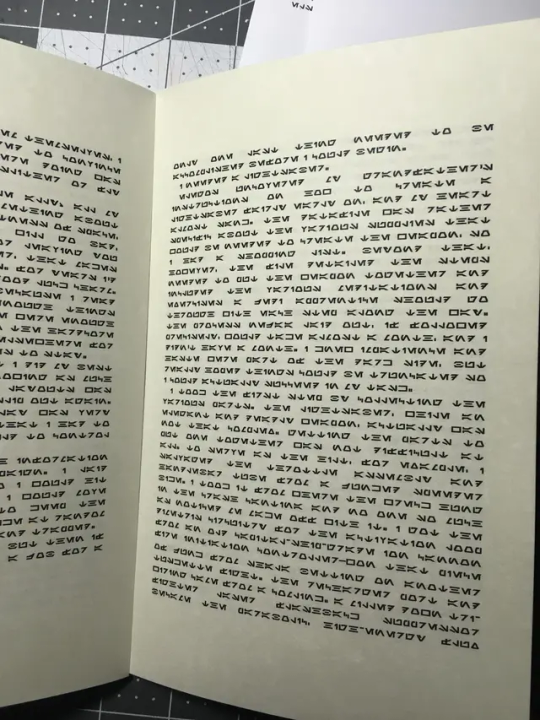
Sad rambling: Why are there no good fictional sign languages? Not even one. I know there’s the Yautja hand language from the Predator universe, and there’s the battle sign language in Dune, but these are not developed. We don’t get to learn and use them. I know this is true of many (most) fictional languages, but with the amazing functional languages from fiction we have out there that people can speak, I suppose I am disappointed.
Green links lead to -> reddit.com, reddit.com, tumblr.com, etsy.com, tumblr.com, reddit.com, tumblr.com, cheunha-translator-app.netifly.app, reddit.com, lepetitprince.eu, ebay.com, and reddit.com, respectively.
#defictionalization#fictional#makeitreal#fandom#fan creations#fictional languages#star trek#dune movie#dune#dune part two#chakobsa#aurebesh#hamlet#klingon#conlangs#constructed language#cheunh#le petit prince#translation#transliteration#makeitrealother#makeitrealhonorary
0 notes
Text
Body Language Cheat Sheet For Writers
╰ Facial expressions
These are your micro-signals, like the blinking neon signs of the soul. But they’re small, quick, and often lie harder than words.
Raised eyebrows — This can mean surprise or disbelief, sure. But it can also be a full-on, silent “Are you serious right now?” when someone’s being ridiculous. Or even curiosity when someone’s too emotionally repressed to askthe damn question.
Furrowed brow — That face people make when they’re doing long division in their head or trying to emotionally process a compliment. It’s thinking, yes—but also confusion, deep frustration, or quiet simmering rage.
Smiling — Can be happiness… or total fake-it-till-you-make-it energy. Some smiles are stiff. Some don’t reach the eyes. Show that.
Frowning — Sure, sadness. But also: disappointment, judgment, or the universal “I’m about to say something blunt, brace yourself.”
Lip biting — It’s not just nervousness, it’s pressure. Self-control. Anticipation. It’s the thing people do when they want to say something and decide, at the last second, not to.
╰ Eye movement
The window to the soul? Yeah. But also the window to when someone’s lying, flirting, or deeply trying not to cry in public.
Eye contact — Confidence or challenge. Eye contact can be gentle, curious, sharp like a blade. Sometimes it’s desperate: “Please understand me.”
Avoiding eye contact — Not always guilt. Sometimes it’s protectiveness. Sometimes it’s “I’m afraid if I look at you, you’ll see everything I’m trying to hide.”
Narrowed eyes — Calculating. Suspicious. The look someone gives when their brain’s saying “hmmm...” and it’s not a good hmm.
Wide eyes — Surprise, yes. But also sudden fear. The oh-God-it’s-happening look. Or when someone just found out they’re not as in control as they thought.
Eye roll — Classic. But try using it with tension, like when someone’s annoyed and trying very hard not to lose it in public.
╰ Gestures
This is where characters’ emotions go when their mouths are lying.
Crossing arms — Not just defensive. Sometimes it’s comfort. A self-hug. A barrier when the conversation is getting too personal.
Fidgeting — This is nervous energy with nowhere to go. Watch fingers tapping, rings spinning, sleeves tugged. It says: I’m not okay, but I’m trying not to show it.
Pointing — It’s a stab in the air. Aggressive, usually. But sometimes a desperate plea: Look. Understand this.
Open palms — Vulnerability. Honesty. Or a gesture that says, “I have nothing left to hide.”
Hand on chin — Not just thinking. It’s stalling. It’s delaying. It’s “I’m about to say something that might get me in trouble.”
╰ Posture and movement
These are your vibes. How someone occupies space says everything.
Slumped shoulders — Exhaustion. Defeat. Or someone trying to take up less space because they feel small.
Upright posture — Not always confidence. Sometimes it’s forced. Sometimes it’s a character trying really, really hard to look like they’re fine.
Pacing — Inner chaos externalized. Thinking so loudly it needs movement. Waiting for something. Running from your own thoughts.
Tapping foot — Tension. Irritation. Sometimes a buildup to an explosion.
Leaning in — Intimacy. Interest. Or subtle manipulation. (You matter to me. I’m listening. Let’s get closer.)
╰ Touch
This is intimacy in all its forms, comforting, protective, romantic, or invasive.
Hugging — Doesn’t always mean closeness. Could be a goodbye. Could be an apology they can’t say out loud. Could be awkward as hell.
Handshake — Stiff or crushing or slippery. How someone shakes hands says more than their words do.
Back patting — Casual warmth. Bro culture. Awkward emotional support when someone doesn’t know how to comfort but wants to try.
Clenched fists — Holding something in. Rage, tears, restraint. Fists mean tension that needs somewhere to go.
Hair tuck — Sure, flirtation or nerves. But also a subtle shield. A way to hide. A habit from childhood when someone didn’t want to be seen.
╰ Mirroring:
If two characters start syncing their body language, something is happening. Empathy. Chemistry. Shared grief. If someone shifts their body when the other does? Take notice. Other human bits that say everything without words...
Nodding — Not just yes. Could be an “I hear you,” even if they don’t agree. Could be the “keep going” nod. Could be patronizing if done too slow.
Crossed legs — Chill. Casual. Or closed-off, depending on context. Especially if their arms are crossed too.
Finger tapping — Time is ticking. Brain is pacing. Something’s coming.
Hand to chest — Sincerity, yes. But also shock. Or grounding—a subconscious attempt to stay present when everything feels like too much.
Tilting the head — Curiosity. Playfulness. Or someone listening so hard they forget to hide it.
Temple rub — “I can’t deal.” Could be physical pain. Could be stress. Could be emotional overload in disguise.
Chin stroking — Your classic “I’m judging you politely.” Often used in arguments between characters pretending to be calm.
Hands behind the back — Authority. Control. Or rigid fear masked as control.
Leaning body — This is the body betraying the brain. A tilt toward someone means they care—even if their words are cold.
Nail biting — Classic anxiety. But also habit. Something learned. Sometimes people bite because that’s how they self-soothe.
Squinting — Focusing. Doubting. Suspicion without confrontation.
Shifting weight — Uncomfortable. Unsure. Someone who wants to leave but doesn’t.
Covering the mouth — Guilt. Hesitation. The “should I say this?” moment before something big drops.
Body language is more honest than dialogue. If you really want to show your character’s internal world, don’t just give them lines. Give them a hand that won’t stop shaking. Give them a foot that won’t stop bouncing. Give them a mouth that smiles when their eyes don’t. And if you’re not sure what your character would do in a moment of fear, or love, or heartbreak, try acting it out yourself. Seriously. Get weird. Feel what your body does. Then write that down.
#writing#writerscommunity#writer on tumblr#writing tips#writing advice#character development#writer tumblr#writblr#writing help#body language#writers#aspiring writer#creative writing#fiction writing#tumblr writing community#writeblr#writer community#writer stuff
5K notes
·
View notes
Text
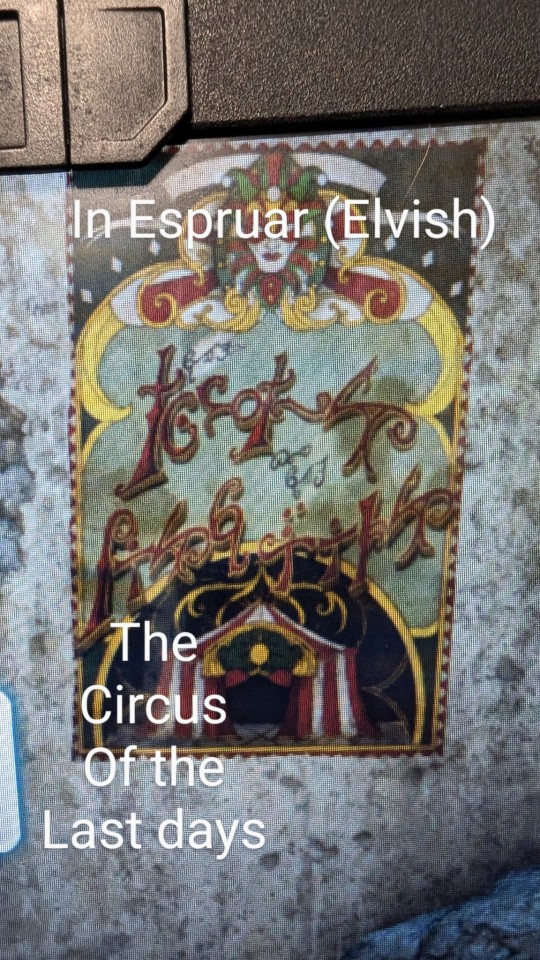
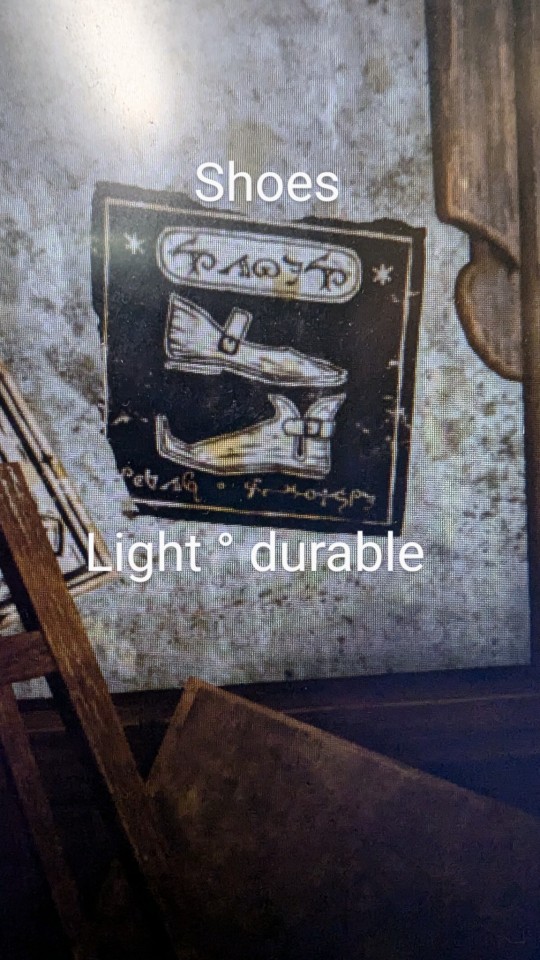
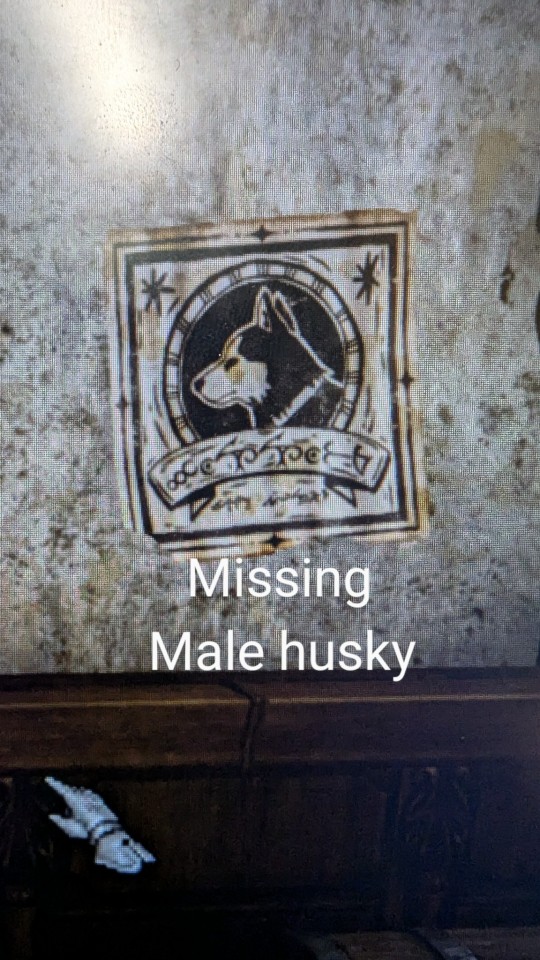
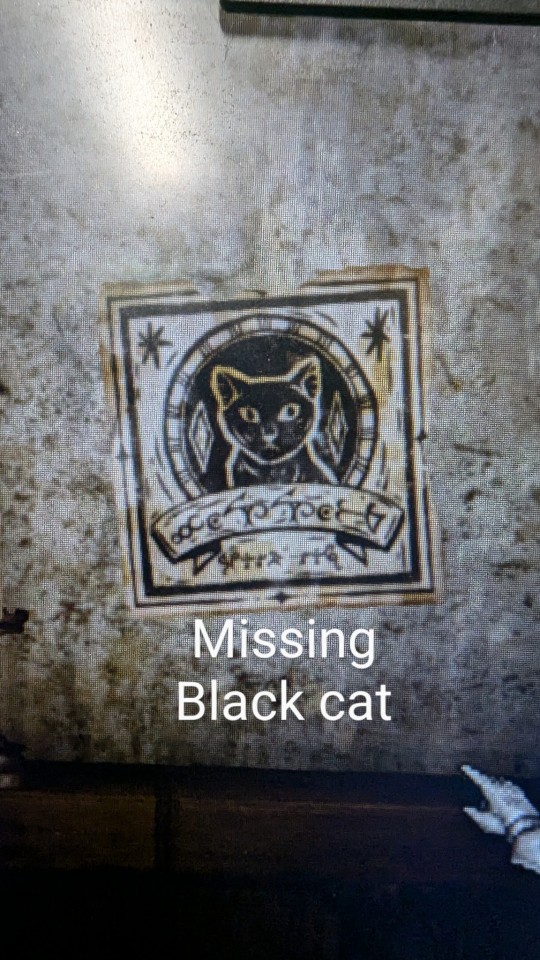
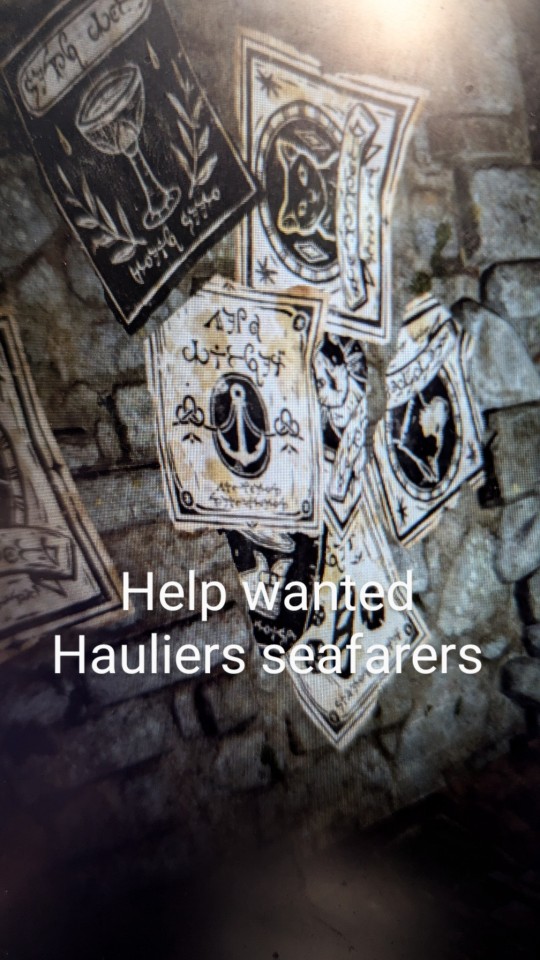
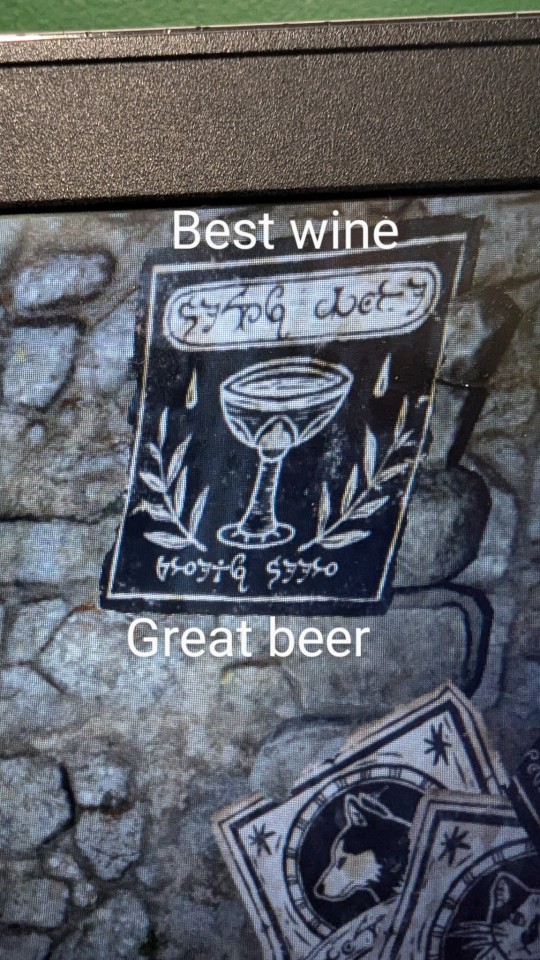
[Collective ID: a collection of posters from Baldur's Gate 3. The text on each poster is in Espruar, the Elvish script in Dungeons and Dragons. /End ID]
Awhile ago I translated a bunch of signs I found in the Last Light Inn, and I've just entered Act 3 so now I've got plenty of new signs to look at! I wasn't expecting so much of the signage to be in the Elvish script, I wonder why that is. I'm not as fluent with the alphabet as I am with Thorass, and some of these posters were really stinking tiny haha. (I recommend having Shovel or a short Tav split from the group to get closer to things!). I was pleased to see the Circus of the Last Days poster does actually say "The Circus of the Last Days" on it, even if it doesn't visibly say all the other stuff the narration claims it does.
There are a couple of signs in Thorass I've found so far:
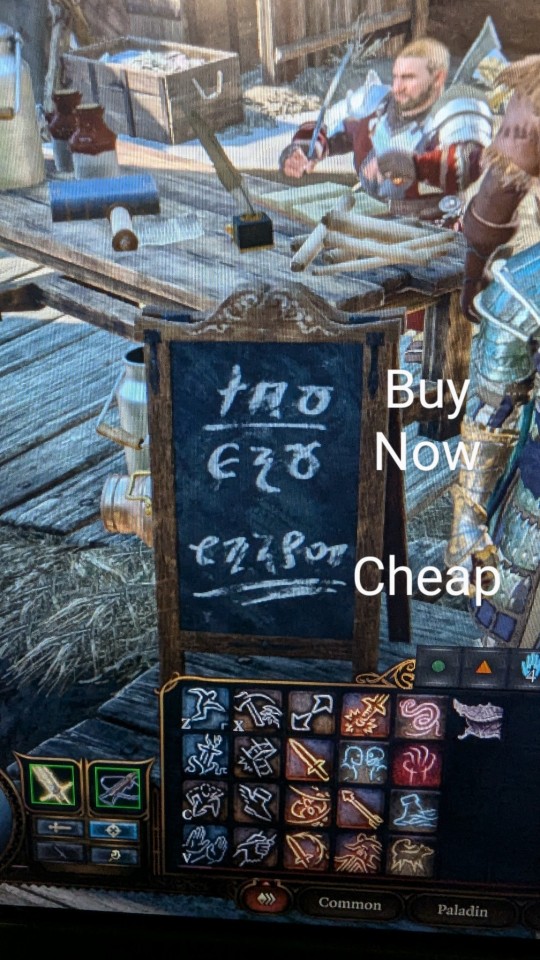

[Collective ID: Two blackboards with text written in Thorass, the Common script in D&D. /End ID]
The Flaming Fist sign on the right fits pretty well with the narration, which says something about the area being an active crime scene, but the "buy now cheap" sign on the left is narrated as being a sign asking for donations for refugees, so that's a funny sign to use for that 😆
Definitely gonna be keeping an eye out for more things to decode, lemme know if there's any you'd like me to squint at!
#ok to reblog#baldur's gate 3#thorass#Espruar#fictional languages#dungeons and dragons#you can tell Espruar is the script of the elves because who else has the fucking time to write all those swirls and loops /lh
0 notes
Text
look, I know I've talked about this essay (?) before but like,
If you ever needed a good demonstration of the quote "Any sufficiently advanced technology is indistinguishable from magic", have I got an exercise for you.
Somebody made a small article explaining the basics of atomic theory but it's written in Anglish. Anglish is basically a made-up version of English where they remove any elements (words, prefixes, etc) that were originally borrowed from romance languages like french and latin, as well as greek and other foreign loanwords, keeping only those of germanic origin.
What happens is an english which is for the most part intelligible, but since a lot everyday english, and especially the scientific vocabulary, has has heavy latin and greek influence, they have to make up new words from the existing germanic-english vocabulary. For me it kind of reads super viking-ey.
Anyway when you read this article on atomic theory, in Anglish called Uncleftish Beholding, you get this text which kind of reads like a fantasy novel. Like in my mind it feels like it recontextualizes advanced scientific concepts to explain it to a viking audience from ancient times.
Even though you're familiar with the scientific ideas, because it bypasses the normal language we use for these concepts, you get a chance to examine these ideas as if you were a visitor from another civilization - and guess what, it does feel like it's about magic. It has a mythical quality to it, like it feels like a book about magic written during viking times. For me this has the same vibe as reading deep magic lore from a Robert Jordan book.
#off topic#literature#language#linguistics#science#science history#science fiction#fantasy#physics#atomic theory#anglish#chemistry#robert jordan#the wheel of time#uncleftish beholding
44K notes
·
View notes
Text



details from Renaissance paintings
#lilies#floral#painting#old art#old artists#art history#painting aesthetic#art home#aesthetic art#botanical#botanical art#symbolism#language of flowers#mystical#Catholic#moodyvibes#oil painting#museum#art academia#dark academia#light academia#light acadamia aesthetic#fantasy#whimiscal#historical fiction#european#renaissance#ren faire#artsy aesthetic#flora
3K notes
·
View notes
Text
Path to Nowhere: Cults, Cultures, and Cants project.
Cults, Cultures, and Cants is a fanfic worldbuilding project between me and some friends on the internet. It aims to deepen, expand, change, and add to the lore and setting of the Path to Nowhere gacha game, where the world is ending and hope gives way to mania, from the streets of DisCity to the white sands deep into BR-000 and beyond, as I, the creator, see fit.
Some things to expect of this project:
Cults: Sinners will have the ability to form "cults" by bonding with anyone of a certain mindset. Not unlike the chiefs Shackles. This system will strengthen the abilities "Patron" Sinner and grant new ones to themselves and their "Acolytes".
Cultures: This project will go deep into the nitty gritty of cultures, subcultures, and counter cultures that form within this setting, including their symbols, values, norms, and works.
Cants: Due to the effects of spiritually bonding with a patron, certain speech patterns within the cult will warp and change to the point of being unintelligible between members of one cult, another, and the mainstream cult that is DisCity. In reality, this is due to me, the creator, being a conlanger at heart and always looking for a chance to cram conlangs into any setting I get my hands on.
This is first and foremost a passion project. Anyone interested in this should not expect too much of it. However, I was never meant for the mainstream fandom anyways and love going my own way, so do expect to see some potentially risky (but still safe) head-canons to come into play. Other than that, I look forward to sharing this with you all and, hopefully, get some feedback and ideas from any and all of you who might be reading this.
< - > < - > < - > < - > < - > < - > < - > < - > < - > < - > < - > < - > < - > < - >
Editor's note: I changed the name of this project to Cults, Cultures, and Cants. This is purely for aesthetic purposes and that I love the alliteration.
I bolded the beginning of each explanation to separate the two and tie them to the title of this project.
I have also added some tags to better reach out to the community and have this circulate.
#path to nowhere#ptn cult culture#fanfiction#fan fiction#fanfic#fan project#ptnau#ptn au#path to nowhere alternate universe#worldbuilding#world building#alternate universe#fictional world#fictional culture#fictional cultures#culture building#fictional language#fictional languages#conlanging#language construction#language creation#glossopoeia#headworld#head world#paracosm
15 notes
·
View notes
Text
Struggling with descriptors? Here are some synonyms to make your scene more interesting!
=========
Afraid
=========
Apprehensive
Dread
Foreboding
Frightened
Mistrustful
Panicked
Petrified
Scared
Suspicious
Terrified
Wary
Worried
=========
Annoyed
=========
Aggravated
Dismayed
Disgruntled
Displeased
Exasperated
Frustrated
Impatient
Irritated
Irked
=========
Angry
=========
Enraged
Furious
Incensed
Indignant
Irate
Livid
Outraged
Resentful
=========
Aversion
=========
Animosity
Appalled
Contempt
Disgusted
Dislike
Hate
Horrified
Hostile
Repulsed
=========
Confused
=========
Ambivalent
Baffled
Bewildered
Dazed
Hesitant
Lost
Mystified
Perplexed
Puzzled
Torn
=========
Disconnected
=========
Alienated
Aloof
Apathetic
Bored
Cold
Detached
Distant
Distracted
Indifferent
Numb
Removed
Uninterested
Withdrawn
=========
Disquiet
=========
Agitated
Alarmed
Discombobulated
Disconcerted
Disturbed
Perturbed
Rattled
Restless
Shocked
Startled
Surprised
Troubled
Turbulent
Turmoil
Uncomfortable
Uneasy
Unnerved
Unsettled
Upset
=========
Embarrassed
=========
Ashamed
Chagrined
Flustered
Guilty
Mortified
Self-conscious
=========
Fatigue
=========
Beat
Burnt out
Depleted
Exhausted
Lethargic
Listless
Sleepy
Tired
Weary
Worn out
=========
Pain
=========
Agony
Anguished
Bereaved
Devastated
Grief
Heartbroken
Hurt
Lonely
Miserable
Regretful
Remorseful
=========
Sad
=========
Depressed
Dejected
Despair
Despondent
Disappointed
Discouraged
Disheartened
Forlorn
Gloomy
Heavy hearted
Hopeless
Melancholy
Unhappy
Wretched
=========
Tense
=========
Anxious
Cranky
Distressed
Distraught
Edgy
Fidgety
Frazzled
Irritable
Jittery
Nervous
Overwhelmed
Restless
Stressed out
=========
Vulnerable
=========
Fragile
Helpless
Insecure
Leery
Reserved
Sensitive
Shaky
=========
Yearning
=========
Envious
Jealous
Longing
Nostalgic
Pining
Wistful
=========
#writerscommunity#writing community#writers community#writing help#creative writing#story writing#fiction writing#writers on tumblr#writeblr#writing#vocabulary#writing tips#helping writers#references for writers#writing reference#writing advice#writing resources#writing tips and tricks#grammar#english language#english#synonyms#linguistics#fanfiction tips#creative writers#fanfic tips#character building#creative expression#motivation#creative inspiration
3K notes
·
View notes